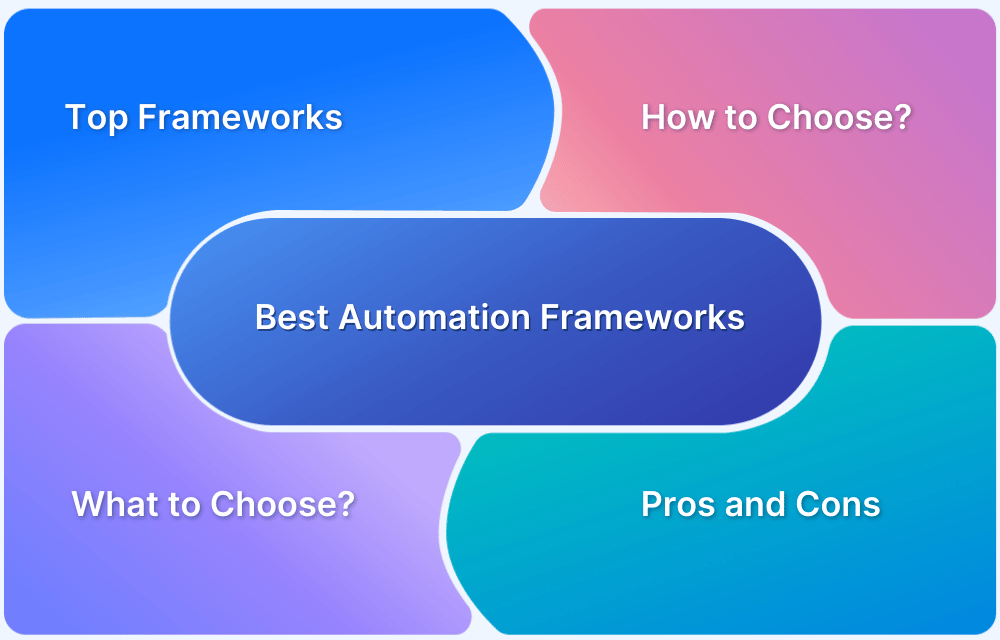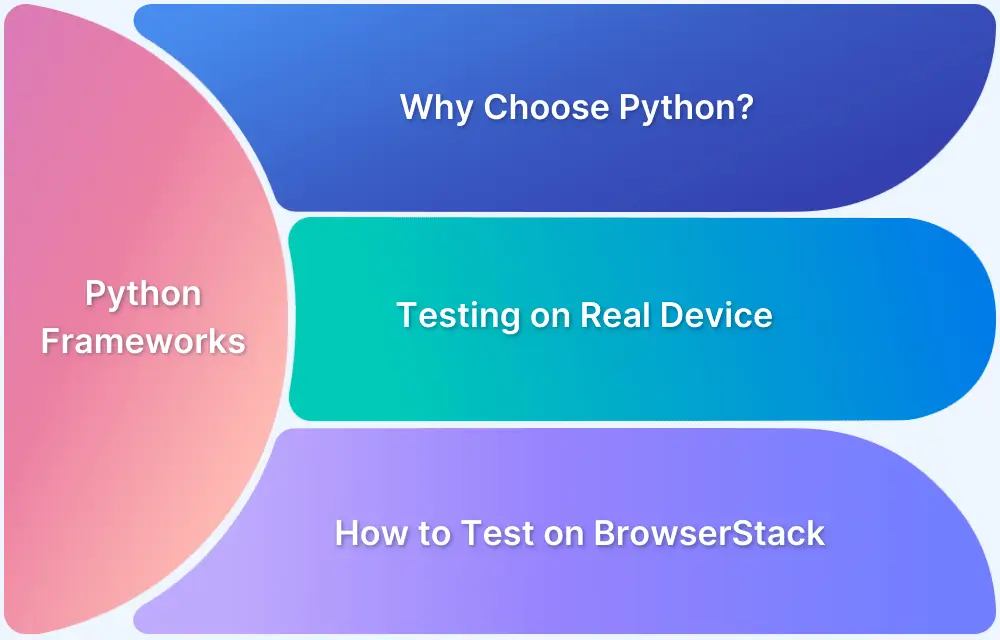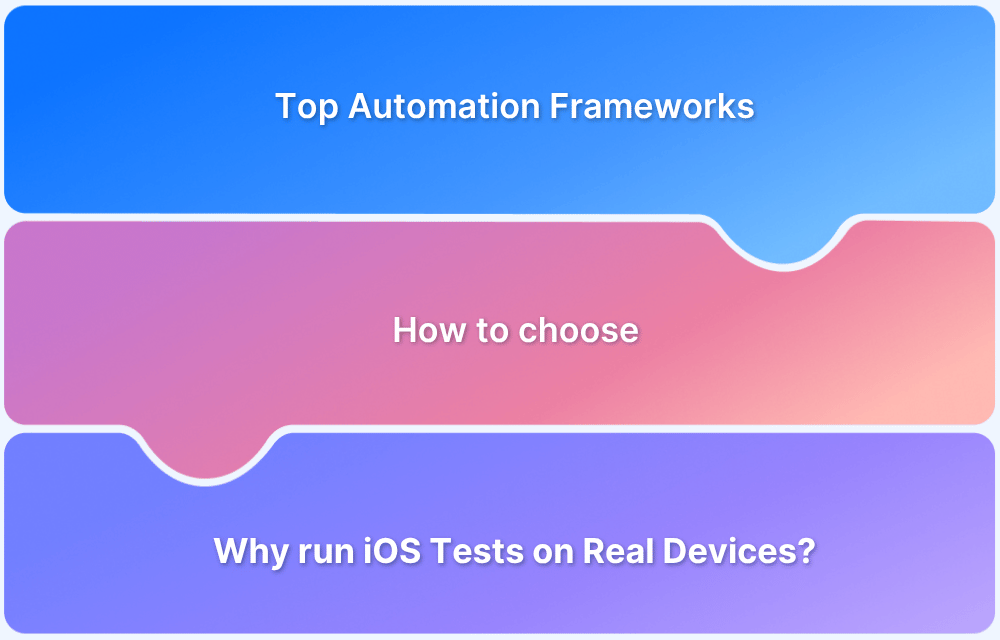With the increasing complexity of mobile apps and a wide range of devices and operating systems, manual testing alone is insufficient. Automation testing of mobile apps ensures faster releases, improved accuracy, and broader test coverage.
Overview
Frameworks for Mobile Automation Testing
- Appium
- NightwatchJS
- Calabash
- XCUITest
- EarlGrey
- Selendroid
- Espresso
- Robotium
This guide highlights the best frameworks that help teams achieve reliable, scalable, and efficient mobile automation testing.
What is Mobile Automation Testing?
Mobile automation testing uses automated testing tools and scripts to assess the functionality, performance, and usability of mobile applications on various device-platforms-OS combinations. The primary goal of mobile automation testing is to ensure the quality and reliability of mobile apps by detecting and preventing defects and regressions.
It involves writing and executing test scripts that automate interactions with a mobile app. These scripts simulate user actions like tapping buttons, entering text, swiping, and scrolling.
Automated Mobile Application Testing Frameworks
There are many frameworks and tools used for mobile application testing. Some of the most popular ones are:
1. Appium
Appium is a popular open-source framework used for automated mobile app testing. It allows developers to automate the testing of native or hybrid iOS and Android applications. Appium doesn’t work alone. It runs the test cases using the WebDriver interface.
Features of Appium:
- Like Selenium, Appium allows QAs to create test scripts in multiple programming languages – Java, JavaScript, PHP, Ruby, Python, and C#.
- Appium is especially favored for being a flexible, cross-platform framework that testers can use to create test scripts applicable to multiple platforms (Windows, iOS, and Android) – using the same API.
- Essentially, Appium users can reuse their source code for Android and iOS, thus reducing the time and effort of building tests. Unlike other automation tools, Appium doesn’t require you to modify the app’s source code to enable automation.
- Supports the automation of native, hybrid, and mobile web applications, accommodating a wide range of app types.
- Integrates with cross-platform mobile app development frameworks like React Native, Xamarin, and Flutter.
- Provides built-in tools like Appium Desktop and Appium Inspector to inspect app elements and generate test scripts
Pros:
- Supports multiple programming languages (Java, JavaScript, Python, C#, etc.).
- Enables cross-platform testing for iOS and Android with a single API.
- Doesn’t require modification of the app’s source code.
- Supports native, hybrid, and mobile web applications.
- Works with frameworks like React Native, Xamarin, and Flutter.
- Offers built-in tools (Appium Desktop, Appium Inspector).
Cons:
- Slower test execution compared to native frameworks.
- Requires a learning curve for beginners.
- Limited support for advanced gestures and animations.
2. NightwatchJS
NightwatchJS is a Node.js based framework that is developed and maintained by BrowserStack. Nightwatch uses Appium under the hood to achieve mobile application automation on virtual simulators & real devices. Nightwatch also takes care of the entire installation with just a single command.
Features of NightwatchJS:
- One command setup of SDKs and libraries to run your tests
- Native Nightwatch commands
- Integration with Appium Inspector
- Supports parallel test execution, allowing you to run tests on multiple browsers and devices simultaneously, which can help speed up test execution
- Nightwatch.js can be configured to test web-based mobile applications with real devices or emulators/simulators
Pros:
- Easy setup with one command installation.
- Supports parallel test execution for faster test runs.
- Works with real devices and emulators/simulators.
- Integrates seamlessly with Appium and Appium Inspector.
- Uses JavaScript, making it developer-friendly.
Cons:
- Limited community support compared to Appium and Espresso.
- Requires Node.js, which may not suit all development teams.
- Best suited for web-based mobile apps rather than native apps.
3. Calabash
Calabash is a mobile test automation framework that works with multiple languages. It supports Ruby, Java, Flex, and .NET. Testers can use APIs to enable native applications that run on touchscreen devices. This framework has libraries that allow test scripts to interact programmatically with native and hybrid apps.
Features of Calabash:
- Allows you to write and execute automated tests for mobile applications on both iOS and Android platforms.
- Reuse test scripts across different platforms and devices, reducing the effort required to maintain and update test suites
- Supports testing native and hybrid mobile applications
- Supports multiple programming languages for writing test scripts, including Ruby and .NET languages like C#.
- Supports parallel testing, which can significantly reduce test execution time
Pros:
- Supports multiple languages (Ruby, Java, .NET).
- Works for both iOS and Android platforms.
- Allows interaction with native and hybrid apps.
- Enables parallel test execution to speed up testing.
Cons:
- Requires additional setup for integration with CI/CD pipelines.
- Official support and development have slowed down.
- Not as widely adopted as Appium or Espresso.
4. XCUITest
XCUITest is Apple’s native automation framework for testing iOS applications. Among mobile testing tools, this one is best known for testing iOS apps. Launched by Apple in 2015, the XCUITest framework is meant to create and run UI tests on iOS apps using Swift / Objective C.
Features of XCUITest:
- Built and maintained by Apple, ensuring compatibility with the latest iOS versions and features.
- It is known for fast execution, intuitive operation, low flakiness, and easy test management.
- Write XCUITest test scripts in Swift or Objective-C, allowing developers to leverage their existing language skills.
- Supports testing on both real iOS devices and simulators, enabling comprehensive test coverage.
- Provides APIs to interact with device features such as the camera, GPS, accelerometer, and more, allowing for a wide range of test scenarios.
- Includes accessibility testing features to ensure that your app is usable by individuals with disabilities
- It offers a robust set of features for automating iOS app tests, and its close integration with XCode and XCTest makes it a reliable choice for iOS app automation testing.
Pros:
- Native framework for iOS, ensuring high performance.
- Faster execution compared to cross-platform tools.
- Deep integration with Xcode and Swift.
- Supports accessibility testing.
Cons:
- Limited to iOS and cannot be used for Android testing.
- Requires knowledge of Swift/Objective-C.
- No built-in cross-platform testing support.
5. EarlGrey
Developed by Google, EarlGrey is a testing framework beneficial for creating UI and functional tests.
EarlGrey 2.0 combines EarlGrey with XCUITest, thus allowing iOS testing along with Android. Google uses EarlGrey to test iOS versions of its apps such as Youtube, Gmail, etc.
Features of EarGrey:
- EarlGrey uses an interaction-driven approach, where tests are written to simulate user interactions with the app’s UI elements. This approach promotes realistic testing scenarios.
- Supports testing of native iOS UI components, such as alerts, navigation controllers, and tab bars
- Write EarlGrey test scripts in Swift or Objective-C, making it accessible to developers with different language preferences.
- Supports parallel test execution across multiple devices.
- Automate complex gestures and interactions, including scrolling, swiping, pinching, and multi-finger taps.
Pros:
- Developed by Google, ensuring compatibility with iOS updates.
- Offers built-in synchronization to reduce flaky tests.
- Allows interaction-based UI testing.
- Supports complex gestures and parallel test execution.
Cons:
- Limited to iOS testing.
- Less popular compared to XCUITest and Appium.
- Requires Swift/Objective-C knowledge.
Start Testing with EarlGrey on BrowserStack
6. Selendroid
Selendroid is also known as Selenium for mobile apps for Android. Testers can do native and hybrid mobile application testing using Selendroid. Selendroid can execute parallel test cases on multiple devices, similar to Selenium for cross browser testing.
Features of Selendroid:
- Automate testing for both native and hybrid Android applications.
- Can automate web app testing on the Android browser, in addition to native and hybrid app testing
- Selendroid allows you to write test scripts in various programming languages such as Java, C#, Python, and Ruby.
- It provides an inspector tool that allows you to inspect the app UI elements and generate test scripts based on the identified elements
- Selendroid supports automated gestures like swiping, tapping, and pinching, enabling realistic user interactions in your tests
Pros:
- Works well for testing Android web, hybrid, and native apps.
- Supports multiple programming languages.
- Provides an inspector tool to analyze UI elements.
- Enables parallel test execution.
Cons:
- Limited to Android; no iOS support.
- Not actively maintained as compared to Espresso.
- Lacks advanced synchronization features.
7. Espresso
Espresso is a mobile automation framework from Google that enables creating and deploying of UI tests for Android applications. Since testing the user interface of an application is essential before deploying it, app developers and app testers widely use Espresso. Developers can create a scenario and record how they interact with a device. Next, they can add assertions that verify the behavior of the UI elements of the app by capturing snapshots. The tool saves the recording and generates UI test cases that they can use to test their application.
Features of Espresso:
- It allows both black-box testing and testing of individual components during development cycles.
- This robust framework will enable developers to test both Android native views as well as hybrid web views.
- Espresso test cases can be crafted in Java or Kotlin.
- Its valuable features, synchronized test executions, intent validations, and capabilities to run recipes stand out and are reported as user favorites.
Pros:
- Fast and reliable for Android UI testing.
- Google-backed, ensuring seamless Android integration.
- Synchronized execution reduces flakiness.
- Supports both native views and hybrid web views.
- Supports Java and Kotlin.
Cons:
- Limited to Android applications.
- Cannot perform cross-platform testing like Appium.
- Requires deep integration with the app’s codebase.
8. Robotium
Robotium is a popular open-source tool dedicated to testing android applications only. The test cases are written in Java. Robotium is famous for its ability to write automated black-box test cases. It automates multiple activities that a tester can execute on their android app and takes minimal time to write test cases.
Features of Robotium:
- Automates Android UI testing with black-box testing capabilities.
- Supports both native and hybrid Android applications.
- Requires minimal effort to write test cases in Java.
- Allows automation of multiple activities within a single test case.
- Supports functional, system, and acceptance testing.
- Compatible with a wide range of Android API levels.
- Simulates user interactions such as clicking, swiping, text input, and scrolling.
- Works on both real Android devices and emulators.
- Open-source and widely adopted in the Android development community.
Pros:
- Simple to use for black-box Android testing.
- Allows testing multiple Android activities in a single test case.
- Requires minimal test case writing effort.
Cons:
- Limited to Android only.
- No built-in support for web apps or hybrid apps.
- Doesn’t support cross-platform testing.
Tips and Best Practices for Automated Mobile App Testing
Below are some best practices that engineering teams should follow while thinking about automated mobile application testing :
- Make Application Testable: In the agile age, developers must build applications ready for testing. Developers should actively discuss with testing teams to set guidelines. For example, developers should give elements a unique ID to make them testable.
- Do not overuse the XPath: XPath is a query language that can select nodes in an XML file. It can be used for navigating across elements while testing. Google or Apple does not natively provide XPath-type queries. So if testers use them a lot, Appium is forced to make some calls. These under-the-hood calls find XPath-supporting elements but negatively impact the performance.
- Arrange Selectors in the Right Order: XPath is location-based. It is slow compared to the other locators in selenium like ID, Link Text, or Name. Order the selectors so that ID comes first and XPath comes last to identify elements quicker.
- Use Accessibility IDs: Instead of excessive XPath usage, testers can use accessibility ID locators. If users set accessibility IDs on their elements, it makes them more testable and increases the testing scope of their application.
- Consider the View states of the Application: View state is a technique for storing the page value when the application sends or receives information from the server. Suppose there are 15 test cases for the specific functionality of the application. Among them, 10 test cases repeat the same functionality of logging in and going to the page. This duplication is a huge time waste. While developing, set up the application’s view state so that testing begins where needed.
- Don’t compromise with Emulators and Simulators: Emulators and Simulators partially mimic real devices. While they are helpful for testing in the initial stages of app development, they are decidedly inadequate when simulating real user conditions. For instance, an Android simulator cannot mimic low battery or 2G internet when your workstation runs 4G/5G. However, they cannot be released without testing apps in less-than-ideal real-world circumstances. An app tested only on emulators, and simulators will provide unsatisfactory, even negative, user experiences.
- Testing mobile apps on a real device cloud is far more effective.
- BrowserStack provides thousands of mobile devices (iOS, Android, Windows) for QAs to test their apps.
- Testers can access native device features and helpful elements such as geolocation testing and network throttle.
- BrowserStack also provides integrations with mobile testing frameworks such as Appium, EarlGrey, and XCUITest to facilitate quick, convenient, and result-oriented testing.
Conclusion
With the increase in smartphone penetration and time spent on mobile devices, ensuring a seamless mobile app experience is critical. To achieve this, teams must adopt the right testing framework and adopt best practices as described in this guide.
BrowserStack App Automate is a cloud-based testing tool that enables teams to run tests using top automation frameworks on real devices. With instant access to a wide range of devices, teams can accelerate testing, detect bugs early, and ensure flawless app performance across different environments.







